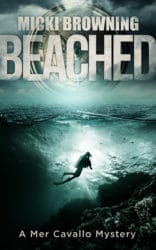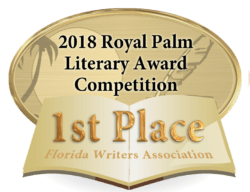
Who would know antagonists better than a police officer? Micki Browning’s career in law enforcement and as a professional dive master have given insider knowledge and intrigue to her work. Her novel Beached won Published Book of the Year at the 2018 Royal Palm Literary Awards after it was already awarded First Place in the Published Mystery and Crime category. Micki shared about her book and her writing journey, along with some great tips for other writers.
Micki’s Writing Journey
I like to joke that I became a professional writer the day I was sworn in as a police officer. Sure, they lure you in with promises of adventure—and there were plenty—but they neglect to tell you about all the paperwork. Factually documenting crimes is a large part of police work, but in many ways writing fiction is more difficult. True, you’re not taking rounds as a writer, but there is a steep learning curve—and always something new to learn.
I have two unpublished manuscripts that will never see the light of day (a good thing), and now two that have been published. While in the query trenches with my first book, Adrift, I entered the manuscript in three contests. One of the judges of the Daphne Contest was an agent who saw enough promise in the novel to offer representation. She then sold the novel to Alibi, an imprint of Random House.

The Winning Entry, Beached
After I finished my career in law enforcement, I retired to the Florida Keys. There, I split my time between writing and scuba diving, and became a professional dive master. Initially, I needed to decompress from a stressful profession and wasn’t ready to write a police procedural. Instead, I chose to write about an amateur sleuth. Dr. Meredith Cavallo, a marine biologist, swam onto the scene in my first book. Beached is the second Mer Cavallo Mystery, and in this book I was able to revisit the crew and send them on a new adventure.
The Keys have a rich history of treasure galleons and pirates that plied the waters of the Florida Straits. By education, I am a medievalist and as I researched, I found ways to blur the line between fact and fiction. I focused on a real treasure fleet that set sail from Cuba on Friday the thirteenth of July, 1733. The fleet was overtaken by a hurricane, and the wrecks are historically well documented. Then I got to tinkering with the facts and wove in an earlier backstory to create the Legend of the Thirteenth Galleon. Who says you can’t do anything with a Medieval Studies degree?
Logline: A marine biologist’s life unravels after she discovers artifacts attributed to a legendary galleon and must outwit a modern pirate who’ll resort to murder to claim the booty first. Read an excerpt here.
Two Truths and a Lie, Writer’s Edition
You can’t revise an empty page.
Write every day.
Plot from the point of view of the antagonist, but write from the POV of the protagonist.
So what’s true? The best bit of advice I ever received was to plot from the POV of the antagonist and then write from the perspective of the protagonist. Initially, I had that backwards and my early writing was episodic. Understanding how the antagonist committed the crime gave me the ability to develop stories that built on prior information and improved my pacing.
The second bit of advice I’ve taken to heart is that a writer can’t edit an empty page (a quip attributed to both Jodi Picoult and Nora Roberts). Fortunately, I love revisions. As a police officer, I often had to make split-second decisions. It’s comforting to know that as a writer I don’t have to produce perfect prose the first time. Even better? I can continue to revisit the words until I’m satisfied (which can lead to a slippery slope all its own).
The lie? Write every day. I’ve tried this, but honestly, I can’t. Some days are better spent gathering experiences and enjoying life–and then writing about it.
Other Works by Micki
My very first paid byline was an article on underwater sound that I sold to a scuba magazine. Since then, I’ve been published in anthologies, mystery magazines, and textbooks. Adrift was my first novel and the recipient of the Royal Palm Literary Award for Unpublished Book of the Year as well as the Daphne du Maurier Award of Excellence for Unpublished Mystery. After it was published in 2017, it went on to be an Agatha finalist for Best First Novel. The second Mer Cavallo Mystery, Beached, is the novel that landed me on this showcase.
Coming Next for this Winner
I’m finally going to put my twenty-two years of police experience to work in a novel. I just sent my agent the manuscript for a stand-alone suspense novel. It’s darker, grittier, and more complex than anything I’ve written to date. I’m really excited about it.
Get Connected with Micki
Visit me at www.MickiBrowning.com to find out more about my writing or events and presentations. While you’re there, I’d love to have you join my newsletter. I have some exciting announcements coming in the near future that I’ll share with my newsletter friends first. I can also be found far too frequently on Facebook at MickiBrowningAuthor, and on Twitter @Micki Browning.
More about RPLA
The Royal Palm Literary Awards competition is a service of the Florida Writers Association established to recognize excellence in members’ published and unpublished works while providing objective and constructive written assessments for all entrants. Judges include literary agents, publishers, film producers, current or retired professors, teachers, librarians, editors, bestselling and award-winning authors, and journalists from across the nation. Entries are scored against the criteria set by RPLA using rubrics tailored to each genre. Winners are announced at the annual FWA conference during the RPLA awards banquet.

First Place Published Mystery or Crime

Beda Kantarjian
Extremely interesting angle. Must try it.
Miki Browning certainly has the rich background for her genres. And I LOVE LOVE LOVE “You can’t revise an empty page.”
Micki Browning
Thank you! When I first encountered the quote about the empty page, it resonated with me, too. Not only is it a reminder to get to work, but also that our words are not chiseled in stone!
Arielle Haughee
I agree! I think that’s great advice for having solid plot points for the protagonist.
Micki Browning
Knowing how the crime was committed allows me to project what my sleuth should be able to deduce and what he or she could misinterpret. It ensures the continuity of the scenes. Plotting the crime first also saves a tremendous amount of time. Win-win!